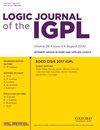可证明性模态逻辑的谓词对应:高不可判定性和Kripke不完全性
IF 0.8
4区 数学
Q2 LOGIC
引用次数: 4
摘要
本文研究了模态命题逻辑$\textbf{GL}$、$\textbf{Grz}$和$\textbf{wGrz}$的谓词对应项及其扩展。证明了$\textbf{QwGrz}$和$\textbf{QGL.3}$之间或$\textbf{QwGrz}$和$_textbf{QGrz.3}美元之间的每个逻辑的Kripke框架上的语义结果集是$\Pi^1_1$-即使在具有三个(有时,两个)单独变量、两个(有时一个)一元谓词字母和一个命题字母的语言中也是困难的。作为推论,证明了基于经典一阶逻辑和模态命题逻辑$\textbf{GL}$、$\textbf{Grz}$和$\textbf{wGrz}$的模态谓词公理系统的无限族不是Kripke完备的。本文的$\Pi^1_1$-硬度和Kripke不完全性结果都不取决于逻辑是否包含Barcan公式。本文章由计算机程序翻译,如有差异,请以英文原文为准。
Predicate counterparts of modal logics of provability: High undecidability and Kripke incompleteness
In this paper, the predicate counterparts, defined both axiomatically and semantically by means of Kripke frames, of the modal propositional logics $\textbf {GL}$, $\textbf {Grz}$, $\textbf {wGrz}$ and their extensions are considered. It is proved that the set of semantical consequences on Kripke frames of every logic between $\textbf {QwGrz}$ and $\textbf {QGL.3}$ or between $\textbf {QwGrz}$ and $\textbf {QGrz.3}$ is $\Pi ^1_1$-hard even in languages with three (sometimes, two) individual variables, two (sometimes, one) unary predicate letters, and a single proposition letter. As a corollary, it is proved that infinite families of modal predicate axiomatic systems, based on the classical first-order logic and the modal propositional logics $\textbf {GL}$, $\textbf {Grz}$, $\textbf {wGrz}$ are not Kripke complete. Both $\Pi ^1_1$-hardness and Kripke incompleteness results of the paper do not depend on whether the logics contain the Barcan formula.
求助全文
通过发布文献求助,成功后即可免费获取论文全文。
去求助
来源期刊
CiteScore
2.60
自引率
10.00%
发文量
76
审稿时长
6-12 weeks
期刊介绍:
Logic Journal of the IGPL publishes papers in all areas of pure and applied logic, including pure logical systems, proof theory, model theory, recursion theory, type theory, nonclassical logics, nonmonotonic logic, numerical and uncertainty reasoning, logic and AI, foundations of logic programming, logic and computation, logic and language, and logic engineering.
Logic Journal of the IGPL is published under licence from Professor Dov Gabbay as owner of the journal.

 求助内容:
求助内容: 应助结果提醒方式:
应助结果提醒方式:


